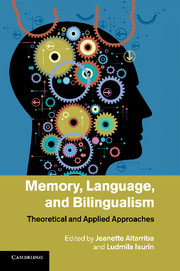Book contents
- Memory, Language, and Bilingualism
- Memory, Language, and Bilingualism
- Copyright page
- Contents
- Figures
- Tables
- Contributors
- Introduction
- 1 Bilingual memory:
- 2 Lexical competition in localist and distributed connectionist models of L2 acquisition
- 3 Working memory and (second) language processing
- 4 Working memory in simultaneous interpreters
- 5 Using electrophysiological measures to track the mapping of words to concepts in the bilingual brain:
- 6 Age effects in L2 learning:
- 7 Bilingualism, language, and aging
- 8 Crossovers and codeswitching in the investigation of immigrant autobiographical memory
- 9 Linguistic relativity and bilingualism
- 10 Testing effects for novel word learning in Chinese–English bilinguals
- 11 The lexicon in second language attrition:
- 12 Memory and first language forgetting
- 13 Future research directions:
- Index
5 - Using electrophysiological measures to track the mapping of words to concepts in the bilingual brain:
A focus on translation
Published online by Cambridge University Press: 05 November 2012
- Memory, Language, and Bilingualism
- Memory, Language, and Bilingualism
- Copyright page
- Contents
- Figures
- Tables
- Contributors
- Introduction
- 1 Bilingual memory:
- 2 Lexical competition in localist and distributed connectionist models of L2 acquisition
- 3 Working memory and (second) language processing
- 4 Working memory in simultaneous interpreters
- 5 Using electrophysiological measures to track the mapping of words to concepts in the bilingual brain:
- 6 Age effects in L2 learning:
- 7 Bilingualism, language, and aging
- 8 Crossovers and codeswitching in the investigation of immigrant autobiographical memory
- 9 Linguistic relativity and bilingualism
- 10 Testing effects for novel word learning in Chinese–English bilinguals
- 11 The lexicon in second language attrition:
- 12 Memory and first language forgetting
- 13 Future research directions:
- Index
Summary
A central question in research on the bilingual mental lexicon is how second language (L2) learners map novel L2 word forms onto their respective meanings. For adult L2 learners, there is already extensive vocabulary knowledge in the first language (L1). How is the new information about L2 represented and processed relative to the L1? Which codes are engaged when translating words from one language into the other? Many previous reviews of the literature have considered these issues (e.g., Kroll & de Groot, 2005). Here we focus on a relatively new source of evidence drawn from recent studies using event-related potentials (ERPs). Because ERPs provide sensitive data about the time course of language processing in the brain, they provide a new opportunity to review the enduring debates in the literature concerning the initial mappings of word form to meaning by L2 learners and their consequences for proficient bilingual performance. We first review the theoretical framework that has shaped this debate, focusing primarily on the Revised Hierarchical Model (Kroll & Stewart, 1994). We then consider briefly the behavioral evidence that has been taken in the past literature to adjudicate alternative claims concerning the role of the L1 translation equivalent in processing L2. We then focus our discussion on recent ERP studies that use variants of the translation task to examine the time course over which information about words in each of the bilingual’s two languages becomes activated and available. We argue that converging evidence from electrophysiological studies provides a powerful tool for understanding L2 performance in both learners and highly proficient bilinguals and for resolving longstanding controversies in the literature.
- Type
- Chapter
- Information
- Memory, Language, and BilingualismTheoretical and Applied Approaches, pp. 126 - 160Publisher: Cambridge University PressPrint publication year: 2012
- 5
- Cited by



